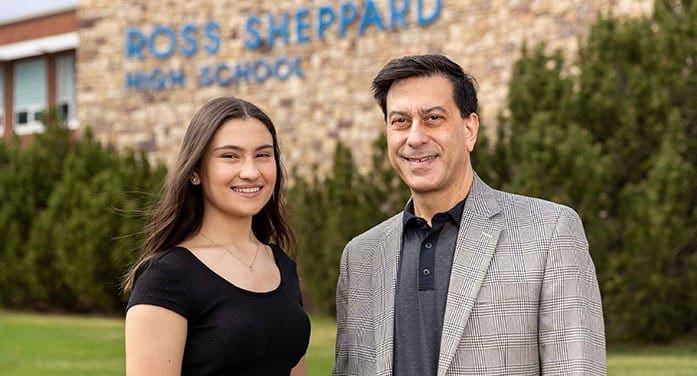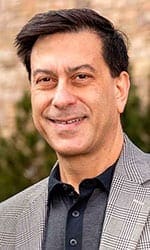One path to a diversified economy is exposing people to entrepreneurship, according to a University of Alberta professor who is partnering with a local high school to pilot an entrepreneurship program.
“If you want to diversify the economy, starting in college with this kind of education is too late,” said Michael Lounsbury, professor and Canada Research Chair in Entrepreneurship and Innovation in the Alberta School of Business. “You want to plant the seeds earlier.”
Lounsbury, whose daughter Valerie attends Ross Sheppard High School, approached the school’s principal, Rick Stanley, about what an entrepreneurship program at the school might look like.
“It’s a great idea. I look at the diversity of our school and I look at the diversity of our city and the world around us, and I believe we need to offer something for everyone,” said Stanley, who graduated from the U of A in 1994.
“I think that entrepreneurship always gives a person the mindset that they have a chance to be successful. They can build it into whatever they see is measured as success in their world, and all they need is a passion and a willingness to work hard.”
Lounsbury introduced Stanley to the entrepreneurism curriculum created by the YELL Foundation – an organization that designs high-school courses that prepare students for the real world while embracing UN Sustainability Goals – which has helped numerous high schools in British Columbia set up entrepreneur programs.
Alvin Lee, who runs the business program at Ross Sheppard – the largest such program in the province – was tapped to work with YELL to create and pilot an Alberta version of Entrepreneurship 30 this September.
“I think entrepreneurship aligns really well with where post-secondary institutions are really wanting to go,” said Lee, who graduated from the U of A in 2008.
“Instead of let’s solve the problem, it’s what are the possibilities and then let’s weigh and measure them, and how do we take our plan from the drawing board and implement it into something realistic.”
The curriculum will include a capstone project to build a pitch-in collaboration with an existing CEO or entrepreneur and present a pitch in a formal competition at the U of A.
Throughout the course, high-school students would also be introduced to the entrepreneurial ecosystem at the U of A through a series of mentors and speakers, as well as visits to eHUB, which was created by Lounsbury and business colleague Tony Briggs in 2014 as a pre-incubator ideas lab to give university students a chance to explore entrepreneurship. eHUB has supported the development of many entrepreneurial teams involving students from across the U of A, enabling young entrepreneurs to transform ideas into successful new ventures.
“We are cultivating this partnership with high-school students to empower them to do whatever they want, and to create that bridge to the U of A, which some students may take advantage of,” said Lounsbury.
If successful, Lounsbury envisions the program being offered at high schools across the province, including in classrooms in Indigenous communities.
“A course like this can be an opportunity to begin to train young people in Indigenous communities in an effort to head towards a virtuous cycle of economic growth and development in those areas, as well as enhance access for these students to the U of A through innovation and entrepreneurship,” he said.
Lounsbury is also in the process of creating an entrepreneurship certificate for university students who are locked into a major but would like to explore and get credit for exploring entrepreneurship. He said the partners hope to find a way to enable high-school students to have their entrepreneurship experience count as credit toward the university certificate.
“Learning about entrepreneurship is a way to get students thinking about what might be possible, and that you don’t need to have it all sorted out right away,” he said. “It’s OK to explore, it’s OK to do things, and switch from one idea to another several times through your 20s and 30s, and not be locked into what you want to be when you are 15.
“Our idea is to help young students gain critical thinking, problem-solving and entrepreneurial leadership skills that will help propel them no matter what they seek to do.”
| By Michael Brown
This article was submitted by the University of Alberta’s Folio online magazine. The University of Alberta is a Troy Media Editorial Content Provider Partner.
© Troy Media
Troy Media is an editorial content provider to media outlets and its own hosted community news outlets across Canada.



